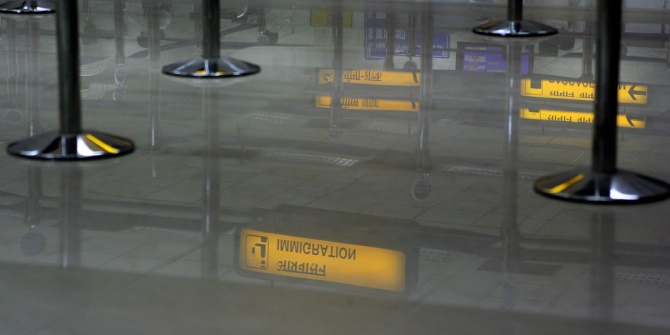 Josh Harris discusses a new report by the Institute for Government which looks at the role of the civil service in supporting the prime minister. He argues that effective government requires that civil service is provided with essential capacities that the prime minister can rely on to carry out the difficult task of leading the government.
Josh Harris discusses a new report by the Institute for Government which looks at the role of the civil service in supporting the prime minister. He argues that effective government requires that civil service is provided with essential capacities that the prime minister can rely on to carry out the difficult task of leading the government.
No job prepares you for being prime minister. They perform three key roles: a party role as leader of the main governing political party; a parliamentary role as leader of the government side in parliament; and an executive role as leader of the executive arm of government. This includes a significant personal role in international diplomacy, national security and crisis management. Leading a political party – or a Whitehall department – is therefore at best a partial preparation. A departmental role has neither the political nor parliamentary exposure nor the breadth of responsibility; an opposition leader, as Tony Blair remarked, ‘says’ rather than ‘does’.
Very soon after entering office, prime ministers have discovered ‘gravitational pulls’ which can inhibit their effectiveness. A prime minister is constrained by the pressures on their time, especially on the international side; the physically limited space they work in; the strength of departments where most resource and formal powers reside; and crises and events. All of these change with the political cycle and can depend on the prime minister’s own authority and on his relationships with colleagues and rivals. The inevitable result is that the urgent frequently crowds out the important.
Tony Blair, Gordon Brown and David Cameron all struggled when they entered Number 10 to organise the support they needed in their executive role to make their governments work. They all reinvented structures on coming into office – too often based on a knee-jerk reaction to what their predecessor did, or a rose-tinted memory of what they knew when their party was last in government – then had to reinvent again when they have a better understanding of governing. Potential prime ministers, and those planning a second term, need to think carefully about how they want to govern. This has to take account of the pressures and pulls they will experience and the different roles they will perform. No job can prepare you fully, but it is better to come into government with open eyes than blind to the challenges.
But responsibility for ensuring the centre of government is fit for purpose is not only the prime minister’s responsibility. The Institute for Government’s new report, Centre Forward, makes clear that the cabinet secretary is responsible for providing a ‘core offer’ of support from the civil service. This would provide the key capacities which any prime minister needs to govern effectively in their executive role. Those key capacities are:
- capacity to provide day-to-day policy advice and support through the Private Office and Policy Unit in Number 10 in particular, making sure that they can gather intelligence and firefight, and to transmit their ideas to departments.
- capacity for longer-term and cross-cutting policy development, including the capacity to challenge conventional thinking in departments and undertake discrete policy projects.
- capacity in the cabinet office for active co–ordination and dispute resolution using better resourced secretariats to connect to the Whitehall machinery to push the prime minister’s agenda but also quality assure and challenge on the PM’s behalf
- capacity on ‘progress assurance’; any prime minister ought to be able to rely on assurance that high risk projects are being managed effectively, but they also need capacity to ensure that their own priorities are being successfully pursued.
- capacity to incubate and catalyse change; prime ministers have created special units to challenge business as usual, but the cabinet office needs to have the capacity to create these units quickly and to be able to advise PMs on how to make them work most effectively.
- capacity to plan and co-ordinate communications and external relations to answer for government across the whole range of business.
This core offer should draw on lessons from what has worked well in the past and best practice internationally. Too often the centre has developed in an ad hoc way, and what little institutional memory there is available is embedded in a handful of long-serving civil servants. This is why our report traces how these different capacities have been configured over the past three decades. Understanding what has been tried before is important to avoid the tendency to repeat and reinvent. It is in the prime minister’s interests to ask for the cabinet secretary’s professional judgement of the support they need to run government in the way they want.
If the civil service fails to provide this core offer, recent experience suggests prime ministers may look elsewhere and create parallel, and potentially less effective, forms of support. To an extent, this happened under Tony Blair with the creation of units – like the prime minister’s Strategy Unit – and relative disuse of central capacities like the cabinet secretariats.
Failing to ensure that these essential capacities are provided means, in the words of one Number 10 insider we interviewed, ‘allowing the prime minister to run it [the centre] as if it’s a court, but it led to the most incredible disorganisation, inefficiency, and the prime minister was getting less good support than he [or she] might have had’. It is inevitable that there will be elements of a ‘court’ environment around a political leader, but a court alone cannot credibly be responsible for leading a £715 billion organisation.
Our proposal is more evolution than revolution. The prime minister facing part of the cabinet office now looks like a de facto department of the prime minister and coalition. Much heat has in the past been generated by whether or not we should call it that. This longstanding debate is a distraction from the real and urgent question of making sure prime ministers can call on the capacity they need. Effective government demands it.
Note: This article gives the views of the author, and not the position of the British Politics and Policy blog, nor of the London School of Economics. Please read our comments policy before posting. Featured image credit: robertsharp
 Josh Harris is a researcher at the Institute for Government. He is co-author, with Jill Rutter, of Centre Forward: Effective support for the Prime Minister at the Centre of Government.
Josh Harris is a researcher at the Institute for Government. He is co-author, with Jill Rutter, of Centre Forward: Effective support for the Prime Minister at the Centre of Government.








The list of capacities is certainly complete. As the author points out, different executives have different needs. It is unlikely that an established bureaucracy can successfully anticipate and respond to every single one of them. Instead of attempting to funnel information, governments must probably accept that they will (as they always have) obtain information from a variety of sources-some better than others.